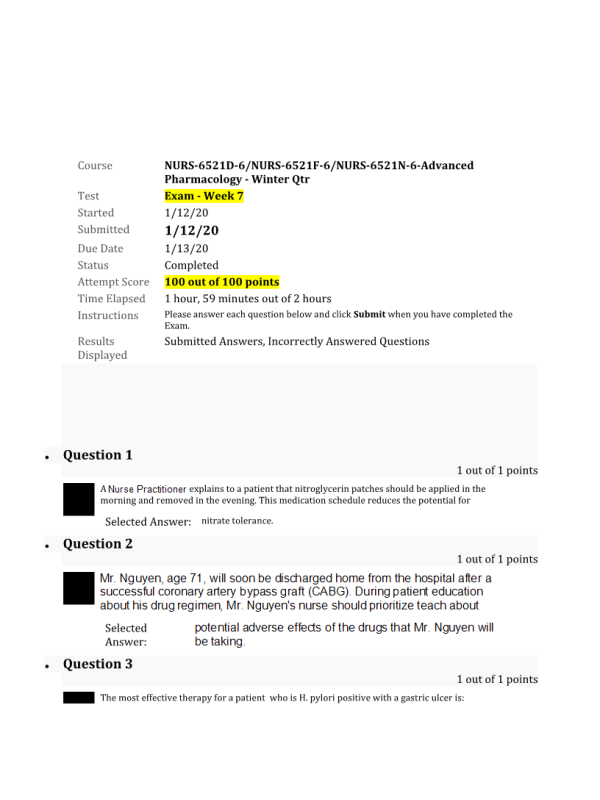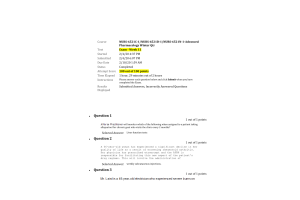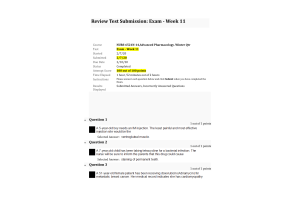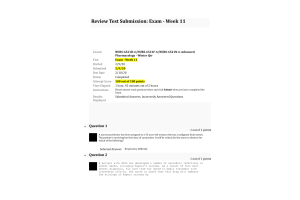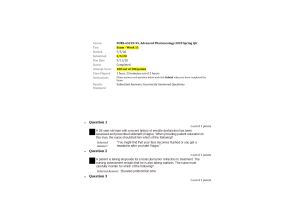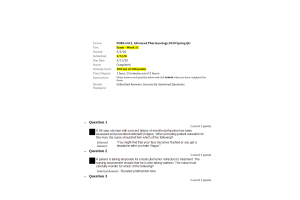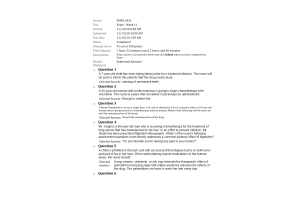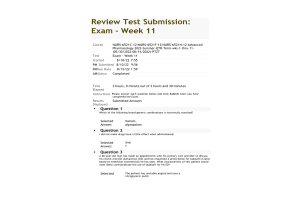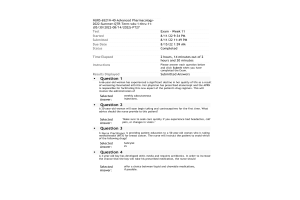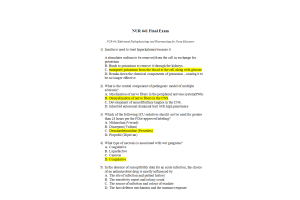NURS 6521D-6, NURS 6521F-6, NURS 6521N-6Exam - Week 7 Midterm100 out of 100 Points
- $49.00
NURS 6521 Advanced Pharmacology
- Question: A Nurse Practitioner explains to a patient that nitroglycerin patches should be applied in the morning and removed in the evening. This medication schedule reduces the potential for
- Question: Mr. Nguyen, age 71, will soon be discharged home from the hospital after a successful coronary artery bypass graft (CABG). During patient education about his drug regimen, Mr. Nguyen's nurse should prioritize teach about
- Question: The most effective therapy for a patient who is H. pylori positive with a gastric ulcer is:
- Question: A 60-year-old African-American man lives with a number of chronic health problems. Genetic factors are likely to influence his etiology and/or treatment of
- Question: A female patient has been taking prednisone for her asthma for 1 month. The nurse will teach her to gradually decrease her dose of prednisone to avoid
- Question: The APRN is treating a 56-year-old male with diagnosed atrial fibrillation. He is complaining of being light headed. His vital signs are BP 100/68 HR 144 RR 22. The best choice of medication to treat this patient is:
- Question: A Nurse Practitioner is caring for a 70-year-old patient who is taking desmopressin (DDAVP). The patient has a history of cardiovascular disease. The nurse will prioritize the assessment of which of the following?
- Question: Which of the following will a Nurse Practitioner inform the patient is one of the most common adverse effects of guaifenesin (Robitussin)?
- Question: Which of the following is TRUE about long acting beta agonist use in asthma patients?
- Question: A patient with a variety of chronic health problems is being seen by her nurse practitioner, who is currently reviewing the patient's medication regimen. Which of the patient's medications should prompt the nurse to teach her to avoid drinking grapefruit juice?
- Question: A Nurse Practitioner is instructing a patient who was recently diagnosed with multiple sclerosis about dantrolene (Dantrium). The patient is a 38-year-old-male and the foreman for a construction company. In order to minimize one important adverse effect of the drug, the nurse will give the patient which of the following instructions?
- Question: A 66-year-old woman has a complex medical history that includes poorly-controlled type 1 diabetes, renal failure as a result of diabetic nephropathy and chronic heart failure (CHF). Her care provider has recently added spironolactone (Aldactone) to the woman's medication regimen. The nurse should consequently assess for signs and symptoms of
- Question: A Nurse Practitioner is caring for a patient who is diabetic and has been diagnosed with hypertension. An angiotensin-converting enzyme inhibitor, captopril, has been prescribed for her. Which of the following should the Nurse Practitioner assess before beginning drug therapy?
- Question: During a clinic visit, a patient complains of having frequent muscle cramps in her legs. The nurse's assessment reveals that the patient has been taking over-the-counter laxatives for the past 7 years. The nurse informed the patient that prolonged use of laxatives
- Question: The Nurse Practitioner is conducting a medication reconciliation of a new resident of a long-term care facility. The Nurse Practitioner notes that the resident takes allopurinol on a daily basis for the treatment of gout. What is the primary purpose of this drug?
- Question: A woman has a long history of seasonal allergies that are typically accompanied by rhinorrhea, red eyes, and frequent sneezing. Sneezes are a result of:
- Question: A patient has been prescribed a Scheduled 5 drug, an example of this drug is
- Question: A Nurse Practitioner is providing discharge planning for a 45-year-old woman who has a prescription for oral albuterol. The Nurse Practitioner will question the patient about her intake of which of the following?
- Question: A patient has been prescribed lovastatin for a high cholesterol level. The nurse's teaching plan will include a basic explanation of how the drug produces its therapeutic effect. The nurse will explain that lovastatin lowers cholesterol levels because it
- Question: A patient with bronchial asthma is prescribed a sustained-release preparation of theophylline. To help minimize the adverse effects of the drug, which of the following should the nurse suggest?
- Question: A Nurse Practitioner is caring for a 78-year-old patient with renal insufficiency and chronic heart failure who is receiving rapid infusions of high-dose furosemide. It will be a priority for the Nurse Practitioner to monitor for
- Question: A 39-year-old African-American male is 25 pounds overweight and has been diagnosed with hypertension after three consecutive above-normal blood pressure readings. The most likely initial drug therapy for this patient will be
- Question: A homeless man who is well known to care providers at the local hospital has been admitted to the emergency department after having a seizure outside a mall. The man is known to be a heavy alcohol user and is malnourished with a very low body mass index. How are this patient's characteristics likely to influence possible treatment with phenytoin?
- Question: A 70-year-old man with diabetes mellitus is taking metoprolol (Lopressor) to manage his hypertension. The nurse would be sure to instruct the patient to
- Question: A normal maintenance dose for digoxin is 0.125 to 0.5 mg/day. In which of the following patients would the nurse most likely administer a lower-than-normal maintenance dose of digoxin?
- Question: A 72-year-old man is prescribed theophylline for symptomatic relief of bronchial asthma. Which of the following findings would alert the nurse to the need for close monitoring?
- Question: A patient with unstable angina pectoris who is NOT controlled with a nitrate would likely benefit most from the addition of:
- Question: A 58-year-old man is admitted to the emergency department. A diagnosis of severe digoxin toxicity is made. Bradycardia is present, and an electrocardiogram (ECG) confirms toxicity. The nurse will administer which of the following drugs?
- Question: A patient is admitted to the emergency department with severe chest pain. The emergency department physician orders intravenous nitroglycerin 5 mcg/min, titrate dose by 5 mcg/min every 3 to 5 minutes per infusion pump as needed. Before administering the nitroglycerin, the nurse should prioritize which of the following assessments?
- Question: An elderly postsurgical patient has developed postoperative pneumonia in the days following abdominal surgery and is being treated with a number of medications. Which of the following medications that the nurse will administer has the slowest absorption?
- Question: The lower respiratory system utilizes a number of different mechanisms that confer protection and maintain homeostasis. Which of the following physiological processes protects the lower respiratory system?
- Question: A Nurse Practitioner has administered a medication to a patient with hypertension. The prescribed drug is supposed to decrease cardiac output. A decrease in cardiac output would most likely
- Question: A 76-year-old woman has a complex medical history that includes emphysema, osteoporosis, malnutrition, and hypothyroidism. Recently, the woman fell outside her home as a result of weakness and suffered a fracture to her femoral head. The woman's subsequent hip-replacement surgery has been scheduled and the care team recognizes that the use of isoflurane will be most significantly influenced by
- Question: A patient has been prescribed a drug that can be self-administered at home. Which of the following would be the most important information for the nurse to relate to the patient concerning self-administration of a drug?
- Question: The APRN is treating a patient with type 2 diabetes. The patient is on the maximum dose of metformin and glucotrol. Current weight 212 pounds. Labs from this morning indicate a fasting blood sugar of 312 and HbA1C of 9. The APRN wants to start the patient on Lantus 0.2 unit/kg. What dose and instructions should the APRN provide?
- Question: A Native American man who lives a traditional lifestyle is scheduled to have heart surgery. The tribal chief has requested that the tribe's medicine man perform a ritual before the patient goes to surgery. The nurse's response to this request should be
- Question: A patient has been prescribed rabeprazole (Aciphex). It will be important for the nurse to assess the patient's drug history to determine if the patient is taking which of the following drugs?
- Question: A 46-year-old white American has been prescribed a drug that binds to acid glycoproteins. The nurse understands that white Americans usually receive
- Question: A patient has GERD and is taking ranitidine (Zantac). She continues to have gastric discomfort and asks whether she can take an antacid. Which of the following is an appropriate response by the nurse?
- Question: A Nurse Practitioner is caring for a patient who is taking digoxin and a loop diuretic. Which of the following would be most important for the Nurse Practitioner to monitor?
- Question: A 60-year-old man has scheduled a follow-up appointment with his primary care provider stating that the omeprazole (Prilosec) which he was recently prescribed is ineffective. The patient states, "I take it as soon as I feel heartburn coming on, but it doesn't seem to help at all." How should the nurse best respond to this patient's statement?
- Question: What critical piece of information is missing from the following medication order: Amoxicillin 250 mg every 8 hours?
- Question: A male patient is to begin glyburide (Diabeta) for type 2 diabetes. Before the drug therapy begins, a priority action by the nurse will be to assess the patient's
- Question: A Nurse Practitioner is overseeing the care of a young man whose ulcerative colitis is being treated with oral prednisone. Which of the following actions should the Nurse Practitioner take in order to minimize the potential for adverse drug effects and risks associated with prednisone treatment?
- Question: Mr. Tan is a 69-year-old man who prides himself in maintaining an active lifestyle and a healthy diet that includes adequate fluid intake. However, Mr. Tan states that he has experienced occasional constipation in recent months. What remedy should be the nurse's first suggestion?
- Question: Frequent episodes of exercise-related chest pain have caused a 79-year-old woman to use her prescribed nitroglycerin spray several times in recent weeks. This patient's age will have what effect on her use of nitroglycerin?
- Question: A 24-year-old factory worker has been prescribed guaifenesin for the first time. Which of the following will be a priority assessment by the nurse before the patient's first dose?
- Question: A Nurse Practitioner who provides care in a long-term care facility is documenting a new resident's medication regimen on the resident's intake admission. The Nurse Practitioner is documenting the generic, rather than proprietary, names of the resident's current drugs because
- Question: A female patient, age 36, is prescribed inhaled corticosteroid (ICS) for daily use. Which of the following adverse effects should the nurse closely monitor for in this patient?
- Question: A patient has been prescribed an oral drug that is known to have a high first-pass effect. Which of the following measures has the potential to increase the amount of the free drug that is available to body cells?
- Question: Mr. Penny, age 67, was diagnosed with chronic angina several months ago and has been unable to experience adequate relief of his symptoms. As a result, his physician has prescribed ranolazine (Ranexa). Which of the following statements is true regarding the use of ranolazine for the treatment of this patient's angina?
- Question: A Nurse Practitioner is caring for a patient who has been diagnosed with hypothyroidism. Levothyroxine (Synthroid) has been prescribed. Before the drug therapy is started, the nurse will assess for which of the following?
- Question: A 72-year-old man is taking Adderall XR for the treatment of narcolepsy. He is currently having problems with not being able to swallow large tablets or capsules. The man also wears dentures, which makes it even more difficult for him to swallow medication. He is in the clinic to talk to the nurse about his problem. The nurse will instruct him to
- Question: The APRN should educate a diabetic patient that beta blockers may mask the signs and symptoms of
- Question: A Nurse Practitioner is providing patient education to a 35-year-old man who has been prescribed clonidine (Catapres) as part of step 2 antihypertensive therapy. The Nurse Practitioner should anticipate that the drug will be administered
- Question: Mesalamine (Asacol) is prescribed for a 22-year-old woman with Crohn disease. The nurse will discuss with the patient the possibility for which of the following adverse effects related to the new drug therapy?
- Question: Which statement is FALSE regarding the treatment of hyperthyroidism?
- Question: A Nurse Practitioner is administering drugs to a 70-year-old patient who has a reduced plasma albumin level. When assessing the patient for therapeutic outcomes of drug therapy, the Nurse Practitioner will also be careful to observe for
- Question: A 79-year-old woman with a medical history that includes osteoporosis has recently moved to a long-term care facility. Medication reconciliation indicates that the woman has been taking calcitonin, salmon for several years. The nurse should recognize that the most likely route for the administration of this drug is
- Question: A teenage boy has undergone a diagnostic workup following several months of persistent, bloody diarrhea that appears to lack an infectious etiology. The boy has also experienced intermittent abdominal pain and has lost almost 15 pounds this year. Which of the following medications is most likely to treat this boy's diagnosis?
- Question: A Nurse Practitioner is instructing a patient concerning a newly prescribed drug. Which of the following should be included to help improve patient compliance and safety?
- Question: A 45-year-old man who is a construction worker has been diagnosed with hyperlipidemia and has been prescribed lovastatin. The nurse will advise the patient to
- Question: The APRN would use what class of medication to manage COPD?
- Question: A patient in need of myocardial infarction prophylaxis has been prescribed sulfinpyrazone for gout. Which of the following will the nurse monitor the patient most closely for?
- Question: A Nurse Practitioner receives an order to administer a critically ill patient two drugs immediately (stat). The Nurse Practitioner begins the process by
- Question: Following an assessment by her primary care provider, a 70-year-old resident of an assisted living facility has begun taking daily oral doses of levothyroxine. Which of the following assessment findings should prompt the nurse to withhold a scheduled dose of levothyroxine?
- Question: To maximize the therapeutic effect of diphenoxylate HCl with atropine sulfate, the nurse will instruct the patient to take the medication
- Question: The Nurse Practitioner is performing patient education for a woman who will soon begin treatment of hyperlipidemia with simvastatin (Zocor). The patient has asked the Nurse Practitioner if there are any "bad side effects" that she should be aware of. Which of the following statements should underlie the nurse's response?
- Question: Mr. Lacuna is an 83-year-old resident of a long-term care facility who has a diagnosis of moderate Alzheimer disease. Mr. Lacuna's physician recently prescribed oral rivastigmine, but he was unable to tolerate the drug due to its gastrointestinal effects. As a result, he has been ordered the transdermal patch form of the medication. When administering this form of rivastigmine, the nurse should
- Question: To minimize the risk of adverse effects of glucagon when given to an unconscious diabetic patient, as the patient regains consciousness, the nurse should
- Question: A 47-year-old woman has been diagnosed with open-angle glaucoma. Pilocarpine drops are prescribed. The nurse's assessment reveals that the patient has worn soft contact lenses for 15 years. The nurse will instruct the patient to
- Question: Several months of treatment with a statin accompanied by lifestyle modifications have failed to appreciably improve a patient's cholesterol levels. Consequently, the patient has been prescribed cholestyramine. The nurse should recognize that this drug achieves its therapeutic effect by
- Question: A male patient is to begin treatment for pneumonia with an albuterol (Ventolin) inhaler. The nurse will advise the patient that he will most likely experience which of the following common adverse effects of the drug?
- Question: A 77-year-old patient has a long-standing history of hypertension, a health problem that is being treated with metoprolol and a thiazide diuretic. Before administering the 8 AM dose of these medications, what assessments should the nurse perform and document?
- Question: A female patient with a diagnosis of type 1 diabetes mellitus has been experiencing increasing neuropathic pain in recent months, a symptom that has not responded appreciably to conventional analgesics. The patient's care provider has begun treatment with gabapentin (Neurontin). How is the addition of this drug likely to influence the management of the patient's existing drug regimen?
- Question: A Nurse Practitioner who provides care on an acute medicine unit has frequently recommended the use of nicotine replacement gum for patients who express a willingness to quit smoking during their admission or following their discharge. For which of the following patients would nicotine gum be contraindicated?
- Question: A clinic Nurse Practitioner is planning care for a 68-year-old man who has been on omeprazole (Prilosec) therapy for heartburn for some time. Regarding the patient's safety, which of the following would be a priority nursing action?
- Question: Mrs. Houston is a 78-year-old woman who resides in an assisted living facility. Her doctor prescribed digoxin at her last visit to the clinic and she has approached the nurse who makes regular visits to the assisted-living facility about this new drug. What teaching point should the nurse emphasize to Mrs. Houston?
- Question: In light of her recent high blood pressure readings, a patient has been started on a thiazide diuretic and metoprolol (Lopressor), which is a beta-adrenergic blocker. What is the most likely rationale for using two medications to address the patient's hypertension?
- Question: A 70-year-old woman has a complex medical and a current drug regimen that includes calcium and vitamin D supplements for osteoporosis, metformin (Glucophage) for type 2 diabetes, phenelzine (Nardil) for depression, and metoprolol (Lopressor) and furosemide (Lasix) for hypertension. The woman is requesting dextromethorphan for the treatment of a recurrent cough. What component of her drug regimen contraindicates the use of dextromethorphan?
- Question: A 68-year-old man complains of a chronic, nonproductive cough. He states that he has to have relief, that he has been coughing every 2 to 3 minutes, and he is worn out. Dextromethorphan is prescribed for him. Before he leaves the clinic, he asks how long it will take for the medicine to work. The nurse will advise him that he should experience therapeutic effects in
- Question: Which of the following statements best defines how a chemical becomes termed a drug?
- Question: It is determined that a patient, who is in a hepatic coma, needs a laxative. Lactulose is prescribed. Which of the following should the nurse monitor to assess the efficacy of the lactulose therapy?
- Question: The parents of a 7-year-old boy who has just been diagnosed with allergic asthma are being taught about their son's medication regimen by the nurse. The nurse is currently teaching the parents about the appropriate use of a "rescue drug" for acute exacerbations of their son's asthma. What drug should the nurse suggests the parents to use in these situations?
- Question: An expected outcome for a patient who has just taken sublingual nitroglycerin should be
- Question: A patient is in the clinic for seasonal allergic rhinitis. Loratadine (Claritin) is prescribed. Which of the following statements will the nurse include when providing patient education concerning this drug?
- Question: A patient who takes aluminum hydroxide with magnesium hydroxide (Mylanta) frequently for upset stomach, heartburn, and sour stomach is seen regularly in the clinic. The nurse should assess which of the following?
- Question: A 77-year-old man's chronic heart failure is being treated with a regimen of quinapril (Accupril) and furosemide (Lasix). Which of the following assessment findings would suggest that the loop diuretic is contributing to a therapeutic effect?
- Question: A Nurse Practitioner is discussing with a patient the efficacy of a drug that his physician has suggested, and he begin taking. Efficacy of a drug means which of the following?
- Question: A 29-year-old female patient has been prescribed orlistat (Xenical) for morbid obesity. The nurse is providing patient education concerning the drug. An important instruction to the patient would be to
- Question: Advanced practice nurse prescribing of scheduled medications is affected most by:
- Question: A Nurse Practitioner who provides care in a busy clinic is aware of the high incidence and prevalence of hyperlipidemia and the consequent need for antihyperlipidemic in many patients. Treatment of high cholesterol using statins would be contraindicated in which of the following patients?
- Question: A Nurse Practitioner is caring for a 73-year-old man who is receiving drug therapy. He is beginning to exhibit signs of decline in his renal system, yet his current serum creatinine level is normal. The Nurse Practitioner will base the patient's plan of care on the understanding that there is
- Question: A 22-year-old patient is transitioning from oral agents to insulin. He will be taking 20 units of lantus at bedtime and regular insulin before meals. What instructions should the NP provide about the timing and dose of regular insulin?
- Question: You are seeing a 55-year-old patient recently diagnosed with a bleeding ulcer. What should be the initial treatment choice for this patient?
- Question: A 79-year-old patient in a long-term care facility is to receive an intravenous fat emulsion. Which of the following lab values would be a priority for the nurse to assess before administration?
- Question: A patient is bothered with nighttime episodes of bronchoconstriction related to asthma. Which of the following medications can be administered to decrease the nighttime episodes and prevent asthma attacks?
- Question: A 49-year-old woman has been diagnosed with myalgia. The physician has recommended aspirin. The patient is concerned that the aspirin will upset her stomach. The nurse will encourage the patient to
- Question: A 62-year-old male who had a myocardial infarction one year ago is being seen for hypertension. Which medication has the best evidence in mortality reduction?
- Question: A 70-year-old woman with a history of atrial fibrillation takes digoxin and verapamil to control her health problem. Verapamil achieves a therapeutic effect by
- Question: When completing this exam, did you comply with Walden University’s Code of Conduct including the expectations for academic integrity?
